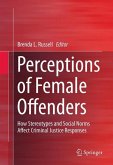Traditional studies of deterrence/rational choice processes included formal sanctions meant to influence the likelihood of whether people will engage in criminal acts. More recent studies include these formal sanctions as well as a limited range of informal sanctions which also appear to have some influence on decisions regarding criminal behavior. However, the existing literature of rational choice models of offending is devoid of studies which integrate formal, informal, and affective costs/benefits. Also, very little research has been done which addresses gender differences in the rational choice processes. Because the female inmate population is the fastest growing population in the U.S. correctional system, more attention must be given to this unique population by researchers. Results from a survey of incarcerated offenders in a Mississippi correctional facility explore the effect of formal, informal, and affective reinforcers on inmates' self-reported likelihood of re-offending. Results contribute to the eventual development of a more comprehensive, integrated model of rational choice that includes a variety of costs and benefits.
Bitte wählen Sie Ihr Anliegen aus.
Rechnungen
Retourenschein anfordern
Bestellstatus
Storno








